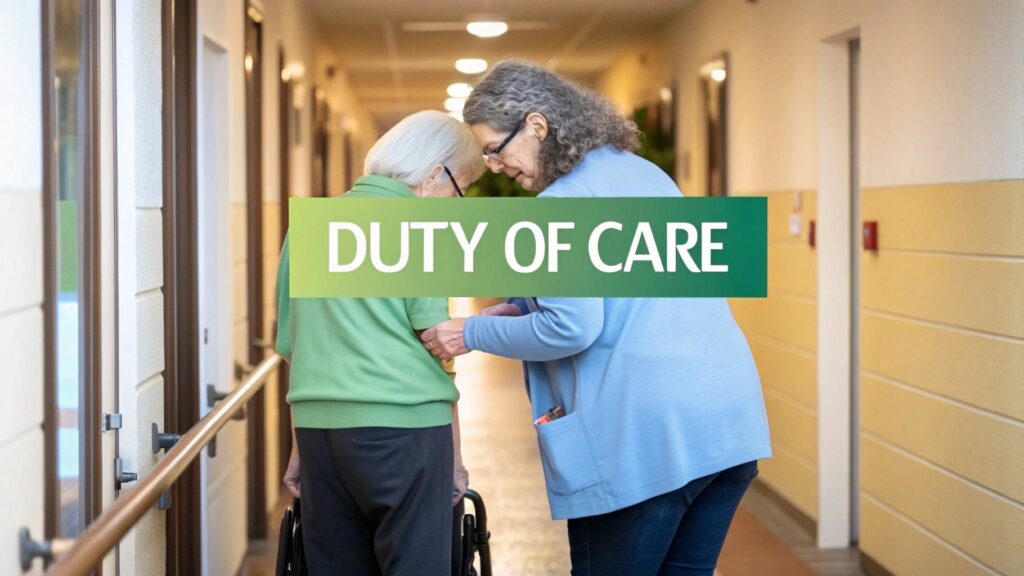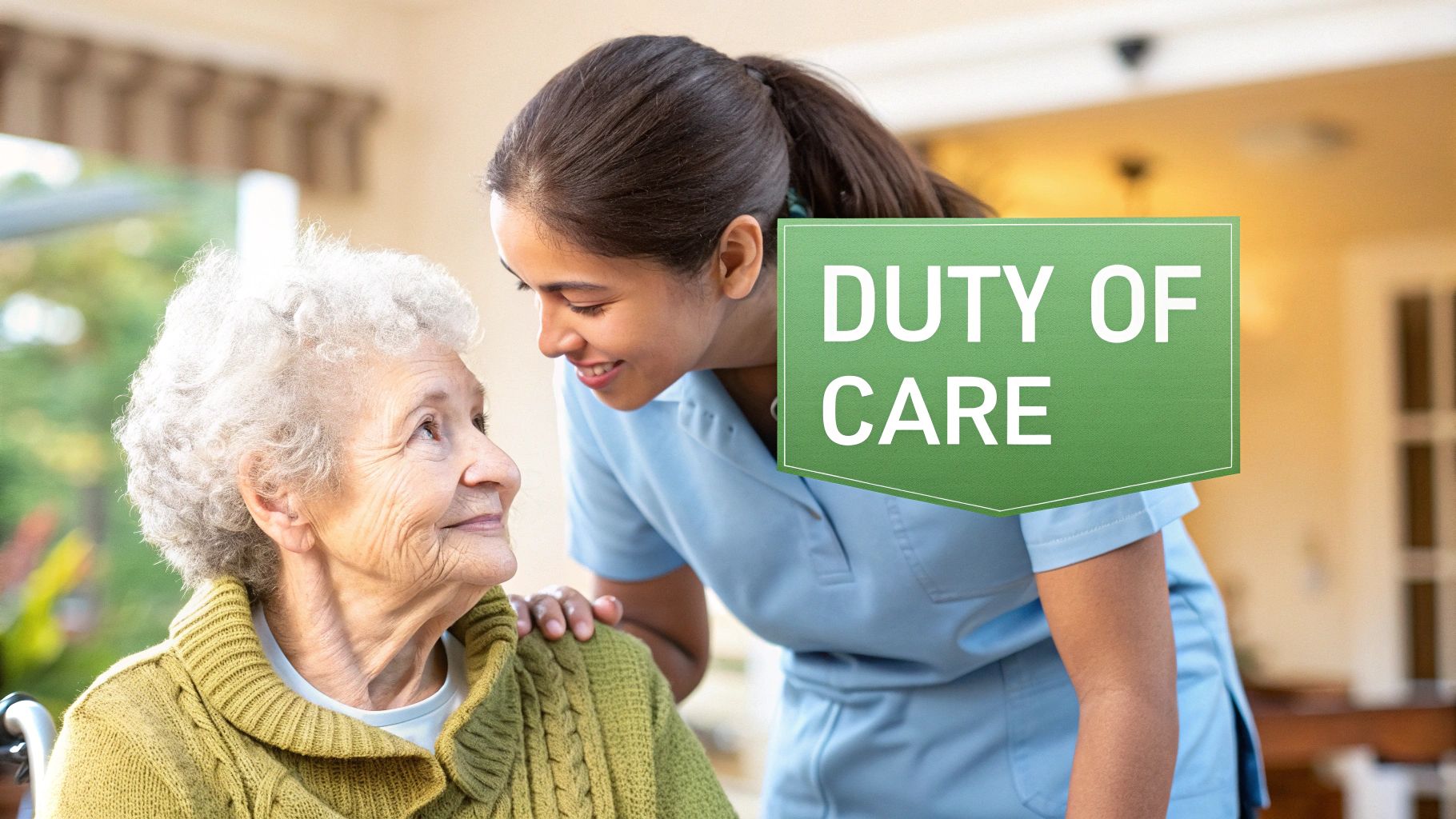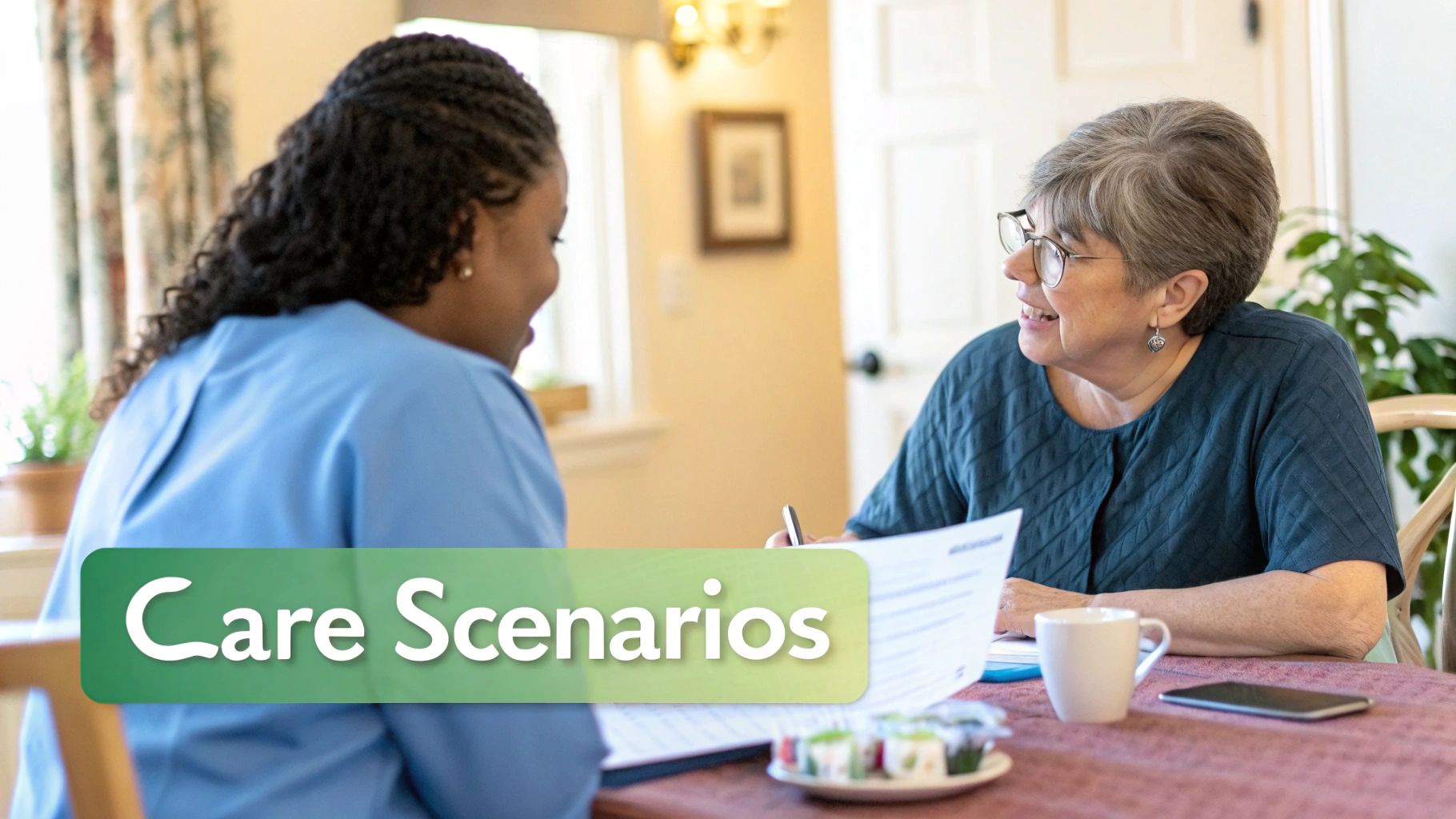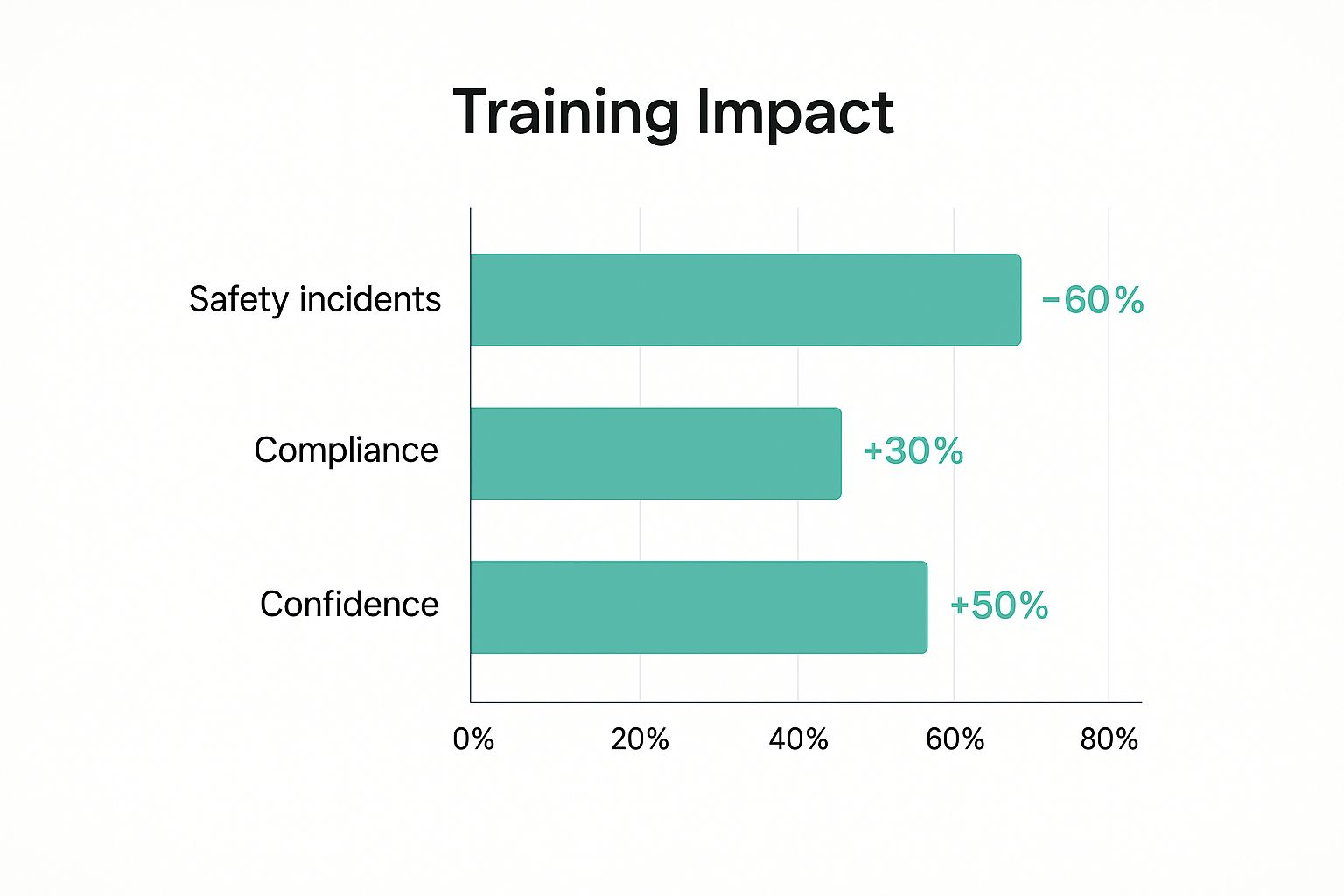
If you're thinking about a career in care, you'll hear the phrase 'duty of care' often. But what does it actually mean? Far from being just professional jargon, it's the legal and ethical promise you make to protect the people you support from any reasonably foreseeable harm. It's the core principle that should guide every decision you make, ensuring the safety and wellbeing of individuals is always your top priority.
This guide will explore exactly what duty of care is, why it’s so crucial for a care worker, and how you can build the skills to uphold it confidently through professional training.
Defining Duty of Care in Your Role as a Carer

At its heart, having a duty of care means you have a professional obligation to act in a way that keeps people safe. This isn't just about being a kind person; it's a solid professional standard that blends legal rules with strong moral commitments. It means using your skills and judgement to make safe, thoughtful choices for those you support.
Think of it as a safety net woven from two essential threads:
-
The Legal Thread: This is the requirement to provide a standard of care that any other reasonably competent professional would. Falling short of this can have serious legal consequences.
-
The Ethical Thread: This is about acting with decency, respect, and compassion. It’s about upholding a person's dignity and honouring their choices, all while keeping them safe from harm.
When woven together, these threads create a strong framework for good practice. It’s a concept that is absolutely central to the adult care sector, which you can learn more about by exploring what adult care truly involves.
Responsibilities vs. Common Misconceptions
One of the trickiest parts of applying duty of care is knowing where your professional responsibility begins and ends. It’s easy to get it wrong. For instance, it’s not about wrapping someone in cotton wool and removing every single risk from their life – doing that would strip them of their independence. It’s about managing risks sensibly.
A carer’s duty is to enable individuals to live their lives as fully as possible while taking reasonable steps to ensure their safety and wellbeing. It's a balancing act between empowerment and protection.
The whole point of duty of care is to constantly improve the wellbeing of the people you support. This commitment to doing better is the very essence of effective Quality Improvement in Healthcare. It ensures the care you provide isn't just 'good enough' but actively helps someone live a better life.
To make this crystal clear, let's contrast what duty of care actually means in practice with some common mistakes. The table below breaks down the key responsibilities versus the myths, giving you a practical snapshot of this vital principle.
Duty of Care At a Glance: Responsibilities vs. Misconceptions
|
Core Responsibility |
Common Misconception |
|---|---|
|
Performing risk assessments to manage potential dangers while respecting a person’s right to make choices. |
Eliminating all risks, which can restrict an individual’s freedom and independence unnecessarily. |
|
Following established procedures and care plans to ensure consistent, safe, and effective support. |
Making decisions based purely on personal judgment, without following professional guidelines. |
|
Reporting concerns about safety, abuse, or neglect promptly to the appropriate authorities. |
Keeping quiet about concerns to avoid causing trouble or upsetting colleagues or family members. |
|
Maintaining accurate and confidential records of care provided, incidents, and changes in condition. |
Viewing paperwork as unimportant or secondary to the hands-on aspects of the caring role. |
|
Empowering individuals to make their own decisions, even if you disagree, as long as they have capacity. |
Overruling a person’s choices “for their own good” without proper assessment or legal justification. |
Ultimately, getting this right means understanding that you are there to support and protect, not to control. It's about finding that professional balance that keeps people safe while respecting their right to live their own life.
The Legal and Ethical Framework in UK Adult Care
In the UK, duty of care isn't just a professional guideline; it’s a solid legal and ethical framework that underpins the entire adult social care sector. This structure gives you, as a care worker, a clear set of rules and principles to follow, making sure the safety and wellbeing of vulnerable adults are always protected.
At the heart of this framework, you’ll find key pieces of legislation. Laws like the Health and Social Care Act 2008 (Regulated Activities) Regulations 2014 set out the fundamental standards of quality and safety that all care providers must meet. These aren’t just suggestions—they are mandatory requirements.
This legal responsibility is enforced by regulatory bodies like the Care Quality Commission (CQC) in England. The CQC inspects services to check that they are safe, effective, and well-led. This system makes sure your duty of care is a measurable, accountable standard.
The Legal Backbone of Compassionate Care
The legal duty of care is built on statute law (Acts of Parliament) and common law (decisions made in court cases). A key legal principle you’ll hear about is 'negligence'. For a care worker to be found negligent, three things must be proven:
-
You had a duty of care towards the individual.
-
You breached that duty by acting (or failing to act) in a way that fell below the expected professional standard.
-
This breach directly caused foreseeable harm to the person.
This legal structure isn't designed to punish genuine mistakes but to prevent reckless or incompetent practice. It creates a powerful reason for you to follow correct procedures, keep your training up to date, and always put safety first.
Understanding your legal duties is the first step towards professional confidence. It empowers you to make decisions that are not only compassionate but also compliant, protecting both the individual in your care and yourself.
Balancing Ethics with Legal Requirements
Beyond the black and white of the law, the ethical side of duty of care is just as crucial. This is all about upholding core human values and ensuring every single person is treated with respect. Ethical principles are your guide in the grey areas where the law might not spell out a specific instruction.
Here are some key ethical principles you’ll apply every single day:
-
Dignity and Respect: Treating every person as a unique individual with their own history, preferences, and values.
-
Autonomy: Supporting people to make their own choices and have control over their own lives, wherever possible.
-
Compassion: Showing empathy and kindness in all your interactions.
-
Trustworthiness: Being reliable, honest, and maintaining confidentiality to build a strong, professional relationship.
These values are not just abstract ideas; they are the very foundation of good practice. The skills and values of a great social care worker are deeply rooted in this ethical framework. It’s this blend of legal knowledge and ethical commitment that transforms a job into a true caring profession.
Navigating Real-World Care Scenarios

Understanding the principles of duty of care is one thing. Applying them under pressure in a real, human situation is where your skill as a carer truly comes to the fore.
The day-to-day reality of adult social care is all about navigating complex and often emotionally charged scenarios. The line between respecting someone’s freedom and ensuring their safety can sometimes feel incredibly blurry. This is precisely why having a solid grasp of your responsibilities is so vital. It gives you a clear framework for making confident, justifiable decisions, even when things get tough.
Let's walk through a few common challenges you're likely to face.
The Refusal of Essential Medication
Picture this: you’re supporting someone with dementia who is adamant they will not take their prescribed heart medication. This puts you in a difficult spot. Your duty of care means you must act to prevent the obvious harm of a missed dose, but you also have to respect their right to say no.
So, what’s the right move? A trained professional knows this isn’t about forcing the issue. Instead, you follow a careful process:
-
Communicate Gently: First, try to understand why they're refusing. A calm, reassuring conversation can often resolve the problem.
-
Assess Mental Capacity: You need to consider if the person has the mental capacity to make this specific decision at this moment. This is a crucial legal step that requires proper training.
-
Consult the Care Plan: Their care plan is your guide. It should have instructions on how to handle medication refusal.
-
Inform and Document: You must report the refusal to your manager and the individual’s GP and meticulously document everything.
Balancing Independence with Safety
Here’s another classic dilemma. An individual at high risk of falling insists on walking to the local shop alone. Their independence is a massive part of their wellbeing, but your duty of care is to protect them from a very real risk of serious injury.
The core of professional care is not to eliminate all risk but to manage it intelligently. It's about finding the safest way to help someone live the life they want.
This situation calls for collaboration, not restriction. You would start with a risk assessment to pinpoint the specific dangers. From there, you can work with the person to find a solution that respects their wishes while reducing the risks, like walking with them or exploring local delivery services together.
While navigating these situations, it's also vital that you can recognise the signs of neglect, ensuring the highest standards of care are being met by everyone involved.
Managing Conflicting Demands
Finally, imagine a family member demands a change to a resident’s diet that goes against a dietician’s advice. In this case, your duty of care is to the resident, and it must be guided by professional medical advice.
Handling this requires diplomacy but also firmness. Your approach would be to:
-
Acknowledge Their Feelings: Show empathy and validate their good intentions.
-
Explain the Risks: Clearly and respectfully explain the health dangers involved.
-
Reinforce Your Role: Gently reiterate that your primary responsibility is the resident’s health and safety.
-
Seek a Compromise: Work with the family and the healthcare team to find a safe alternative.
In all these cases, there’s rarely a simple answer. It takes a blend of compassion, legal knowledge, and problem-solving – the very skills that are sharpened through quality training.
Why Professional Training on Duty of Care is Non-Negotiable
A compassionate heart is a fantastic starting point for a career in care, but on its own, it’s not enough. To truly fulfil your duty of care, good intentions must be matched with professional knowledge and skills. That's where formal training comes in – it's what transforms a kind person into a competent and confident care professional.
This kind of structured learning isn't just a ‘nice to have’; it’s essential for anyone serious about a career in adult social care. It takes you beyond guesswork and gives you a solid grasp of legal boundaries, ethical choices, and the practical skills you need to handle difficult situations with professional poise. Knowing what to do is every bit as important as knowing why you're doing it.
From Good Intentions to Professional Competence
Without proper training, even the most well-meaning person can accidentally make mistakes with serious consequences. A formal qualification provides the essential framework for safe, effective practice.
It teaches you how to balance a person's right to independence with the need for their safety, how to react in an emergency, and how to communicate effectively. This knowledge is your greatest tool for protecting both the people you support and yourself.
Professional training is the bridge between wanting to help and knowing exactly how to help. It builds the confidence to act decisively and correctly, especially when you’re facing a complex ethical dilemma.
This is precisely why a dedicated qualification like the Level 3 Diploma in Adult Care (RQF) is so valuable. It’s been specifically designed to build the competencies that the modern care sector demands.
The infographic below brings home the significant impact that well-structured training has on key areas of providing care.

As the data shows, formal training directly leads to safer environments, much better adherence to legal standards, and a massive boost in a carer's own professional confidence.
A Dedicated Module for a Core Responsibility
Within Stonebridge’s Level 3 Diploma in Adult Care, we’ve dedicated an entire module to this foundational concept: Unit 10: Understand duty of care. This isn’t a topic that’s just skimmed over; it’s explored in depth to ensure you are fully prepared for the realities of the job.
This focused unit covers critical learning outcomes, including:
-
Understanding Safe Practice: You will learn exactly how your duty of care contributes to creating a safe environment.
-
Managing Dilemmas: The course gives you practical strategies for handling conflicts between an individual’s rights and your duty of care.
-
Handling Complaints: You'll gain skills to respond to comments and complaints professionally and constructively.
-
Responding to Incidents: It teaches you how to recognise and respond correctly to adverse events, errors, and near misses.
By completing this module, you aren’t just ticking a box. You are building a professional toolkit to provide the highest standard of care, safely and ethically.
Build Your Skills with the Level 3 Diploma in Adult Care
Knowing what ‘duty of care’ means is one thing. Applying it confidently in your day-to-day work is what makes you a true professional. This is where a qualification like the online Level 3 Diploma in Adult Care (RQF) from Stonebridge comes in, moving you beyond theory and into practical, real-world competence.
The diploma is cleverly structured to break down this huge responsibility into manageable skills. Each module directly contributes to your ability to uphold your duty of care. For example, Unit 1: Promote communication in care settings teaches you to listen and respond effectively – an essential skill for understanding a person’s needs and respecting their autonomy.
This practical focus runs through the entire course. Every unit tackles a different facet of your professional duty, helping you build a robust, well-rounded skill set that prepares you for the realities of the job.
A Curriculum Built for Real-World Challenges
The challenges carers face are immense. As you can see from the latest government statistics on adult social care in England, the sector is under significant pressure. The Level 3 Diploma confronts these challenges head-on. It's designed to equip you with the knowledge to work safely and effectively, building your resilience and competence to protect both the people you support and yourself.
A few standout modules show just how practical this is:
-
Unit 7: Promote health and safety in care settings: This gives you the hands-on skills to prevent accidents and handle emergencies, a fundamental part of stopping foreseeable harm.
-
Unit 11: Understand how to safeguard individuals: This module is crucial. It teaches you how to spot and respond to signs of abuse or neglect, moving beyond general safety to active protection.
-
Unit 12: Understand mental capacity and restrictive practices: Here, you learn how to navigate the complex balance between a person's right to choose and your duty to keep them safe.
The Whole Course is About Duty of Care
While Unit 10 focuses specifically on duty of care, its principles are woven into the fabric of the entire diploma. You can’t separate it from other core concepts like person-centred practice, promoting independence, or handling information—they are all part of the same picture.
This qualification doesn’t just teach you about duty of care in isolation. It integrates the principle into every aspect of your professional development, making it a natural, instinctive part of your practice.
By studying the complete Level 3 Diploma in Adult Care (RQF), you gain a holistic understanding that prepares you for anything. The course’s flexible online format and simple subscription model make it accessible for adult learners. You can study at your own pace, fitting your learning around work and life commitments, all with the full support of qualified tutors. It allows you to build these essential skills without putting your life on hold.
Ready to Start Your Journey in Care?

Perhaps you’ve always had a passion for helping people, and now you’re ready to turn that into a professional career. The first step on that path is understanding your duty of care. Gaining a formal qualification is the surest way to build the confidence and skills you need to not just succeed, but to truly make a difference.
At Stonebridge, we specialise in opening doors for adult learners just like you. We know you’re juggling work, family, and everything else. That's why our Level 3 Diploma in Adult Care (RQF) is delivered online. You can study whenever and wherever works for you, fitting your learning around your own schedule.
Flexible Learning That Puts You in Control
We believe high-quality education shouldn't come with high-stress financial burdens. That’s why we offer a simple, affordable subscription model instead of complicated credit agreements.
A straightforward monthly payment gives you complete access to your course materials and the dedicated support of your personal tutor. This way, you get total freedom and peace of mind.
-
No Long-Term Contracts: You’re never locked into a lengthy financial commitment.
-
Pause or Cancel Anytime: If your circumstances change, you can simply pause or cancel your subscription. No fuss.
-
Affordable Monthly Payments: Your educational budget becomes simple and predictable.
This flexibility means you can invest in your future without putting your present life on hold.
With over twenty years of experience, Stonebridge provides a supportive and fully accredited pathway to a recognised qualification, empowering you to achieve your career goals on your own terms.
Take That Next Step in Your Care Career
Earning your Level 3 Diploma is more than just a piece of paper; it’s your gateway into a secure and incredibly rewarding profession. It’s a chance to do work that matters, every single day. The course curriculum, including the crucial module on duty of care, will give you the practical skills and ethical grounding that employers are looking for.
There’s no need to wait to start building the future you want. With one-to-one tutor support, a flexible payment plan, and a course designed for real-world success, everything is here for you to get started.
Explore the Level 3 Diploma in Adult Care (RQF) today and take your first confident step towards a fulfilling career in care.
Got Questions About Duty of Care?
To bring everything together, let's tackle some of the most common questions that pop up when discussing what duty of care really means in a practical, day-to-day setting.
What Is the Difference Between Duty of Care and Safeguarding?
It helps to think of duty of care as the entire safety net. It's the broad, ongoing responsibility you have to prevent any foreseeable harm to the people you support, covering everything from risk assessments to maintaining a clean environment.
Safeguarding, on the other hand, is a specific and vital part of that net. It zooms in on protecting individuals from targeted dangers like abuse, neglect, and exploitation. Put simply, duty of care is about keeping people generally safe; safeguarding is about protecting them from specific, serious harm.
Can I Be Found Negligent If an Accident Happens?
The legal standard isn't about being perfect; it's about being 'reasonable'. If an accident happens, the crucial question will be whether you acted as a reasonably competent care worker would have in the same situation.
If you can show that you followed correct procedures, carried out risk assessments, and carefully documented your actions, you are demonstrating you fulfilled your duty of care. Negligence is about falling below a professional standard, not about preventing every single accident that could possibly occur.
Does My Duty of Care End When My Shift Is Over?
While your direct, hands-on responsibility is tied to your working hours, your professional duty of care includes ensuring a safe and thorough handover to the next carer or shift. It’s about continuity.
Failing to communicate vital information—like a sudden change in a resident's condition or a new risk you've identified—could lead to harm long after you've left. This break in the chain of care could absolutely be seen as a breach of your duty.
Ready to build the professional skills you need for a rewarding career in care? With Stonebridge Associated Colleges, you can gain a recognised qualification flexibly and affordably.
Explore the Level 3 Diploma in Adult Care (RQF) and start your learning journey today!




